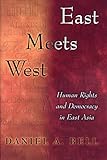East meets west: human rights and democracy in east Asia/ Daniel A. Bell.
Material type: TextPublication details: New Jersy: Princeton University Press, 2000Description: 369 p.; 24 cmISBN: 0691005087Subject(s): East Asia | Democracy | Human rightsDDC classification: 320.95
TextPublication details: New Jersy: Princeton University Press, 2000Description: 369 p.; 24 cmISBN: 0691005087Subject(s): East Asia | Democracy | Human rightsDDC classification: 320.95 | Item type | Current library | Call number | Status | Date due | Barcode | Item holds |
|---|---|---|---|---|---|---|
|
|
Central Library, Sikkim University General Book Section | 320.95 BEL/E (Browse shelf(Opens below)) | Available | P04490 |
Acknowledgments xi
INTRODUCTION 3
PART I THE EAST ASIAN CHALLENGE TO HUMAN RIGHTS AND DEMOCRACY. REFLECTIONS ON EAST-WEST DIALOGUES 21
CHAPTER 1 TOWARD A TRULY INTERNATIONAL HUMAN RIGHTS REGIME 23
1. Trade-offs 35
1.1. Rights vs. Development: A Zero-Sum Game? 35
1.2. The Need for Specificity 37
2. An Asian Voice on Human Rights? 49
2.1. Human Rights: A Western Invention? 49
2.2. Increasing Commitment to Human Rights in East Asia: Strategic Considerations 55
2.2.1. On the Prospects of Exporting American Ideals to East Asia 56
2.2.2. Appealing to the Universal Declaration of Human Rights in Asia 63
2.2.3. Local justifications for Human Rights 68
3. A Different Moral Standpoint? 82
3.1. Cultural Respect vs. Liberal Neutrality 84
3.2. Justifiable Constraints on Western-Style Rights 87
3.3. New "Asian" Rights: Expanding the Set of Internationally Recognized Rights 95
Summary 103
CHAPTER 2 DEMOCRATIC RIGHTS: ON THE IMPORTANCE OF LOCAL KNOWLEDGE 106
1. Trade-off Issues 110
1.1. On the Possibility of Decent Nondemocratic Regimes 110
1.2. The Costs of Democratization 116
2. Democratic Rights: Different justifications 130
2.1. Limiting the Power of the State 130 2.2. Democracy as a Means for Nation-Building 137
2.3. Identifying the Agents of Democratization 142
2.4. Nation-Building and Social Consensus in Confucian Democracies 149
3. Democratic Rights: Different Constraints 158
3.1 Democracy vs. Civil Rights 158 3.2 Democracy vs. Social and Economic Rights 16
3.3 Democracy vs. Future Generations 16
Summary 170
PART II THE PROS AND CONS OF DEMOCRACY IN SINGAPORE: A FICTITIOUS DIALOGUE WITH LEE KUAN YEW 173
CHAPTER 3 IS LIBERAL DEMOCRACY SUITABLE FOR SINGAPORE? 175
1. Democracy Defined as Free and Fair Competitive Elections 176
2. Democracy justified (Only) by Its Consequences 185
3. Democracy and Security 201
4. Democracy and Civil Liberties 213
5. Democracy and Prosperity 219
Summary 232
CHAPTER 4 A COMMUNITARIAN CRITIQUE OF AUTHORITARIANISM: THE CASE OF SINGAPORE 233
1. Community and Democracy 233
2. Democracy and the Family 236
3. Democracy and the Nation 239
3.1. Singapore: A Patriotic Nation? 239
3.2. How Authoritarianism Undermines Patriotism 241
3.3. On the Need for Patriotism in Singapore 253
Summary 271
PART III DEMOCRACY WITH CHINESE CHARACTERISTICS 277
CHAPTER 5 A POLITICAL PROPOSAL FOR THE POST-COMMUNIST ERA 279
1. Constraining Democratic Populism 281
1.1. On the Need for Capable and Far-Sighted Rulers in Modern Societies 281
1.2. A Confucian Tradition of Respect for a Ruling Intellectual Elite 286
2. Alternative Proposals 289
2.1. Plural Voting Schemes 292
2.2. A Corporatist Assembly 294
2.3. A Parliament of Scholar-Officials 299
3. The Proposal 307
3.1. Selection Procedures 307
3.2. The Problem of Cormption 318
3.3. The Question of Universalizability 323
3.4. The Problem of Gridlock 328
3.5. Implementation of the Proposal 332
Closing Scene 335
Select Bibliography 337
Index 353


There are no comments on this title.